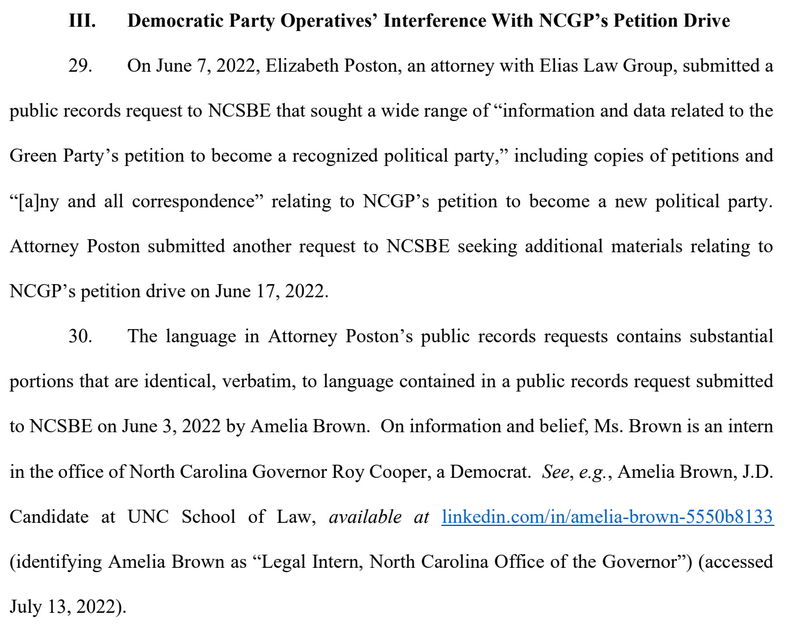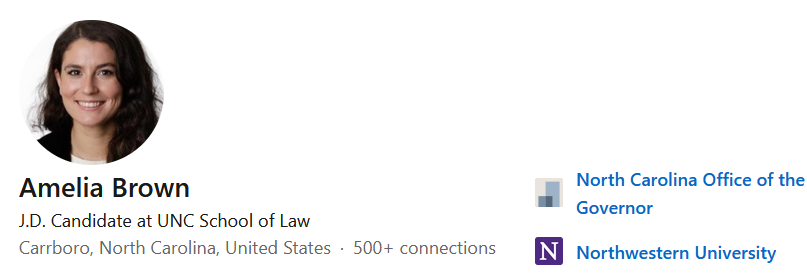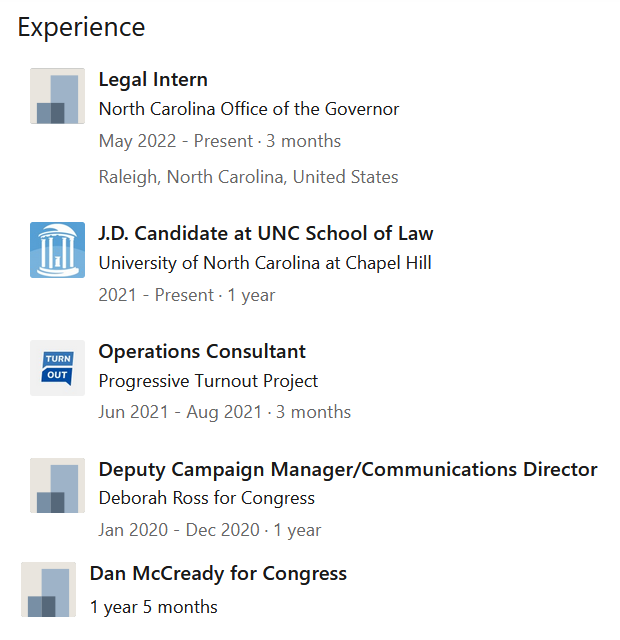In the July 14 lawsuit filed by the N.C. Green Party against the N.C. State Board of Elections (NCSBE), the NCGP pointed to identical language used in public records requests by an Elias Law Group attorney, Elizabeth Poston; and Amelia Brown, an alleged legal intern for Gov. Roy Cooper, as potential evidence that the governor’s office collaborated with Democratic political efforts to exclude the Green Party from the 2022 midterm ballots.

The Elias Law Group is the powerful national Democratic firm that spearheaded the effort to get the NCGP off the ballot in collaboration with the N.C. Democratic Party and the Democratic Senatorial Campaign Committee. But this is the first suggestion that these groups had assistance from fellow Democrat Gov. Roy Cooper.
In the public records request, Brown is not listed as working for Cooper. But her address is given, which is in Carrboro. The Amelia Brown who lists herself on Linkedin as being a legal intern for Cooper also lives in Carrboro.
“I should clarify that the complaint specifies that we don’t know for sure that the Amelia Brown that made the request is the same Amelia Brown that is an intern in the governor’s office; but that’s what we believe and that’s what we alleged,” N.C. Green Party attorney Oliver Hall told Carolina Journal in a July 15 interview.
The Linkedin profile referenced in the suit, retrieved by CJ on July 15, is shown in screenshots below. Brown’s other recent roles were with Democratic and progressive political campaigns.


On July 15, Carolina Journal called the number and emailed the address listed for Brown in the public records request but did not receive a response by publication. Carolina Journal also reached out to the Elias Law Group for comment on this potential connection with the governor’s office but did not receive a response by publication.
On July 15, CJ also reached out to Gov. Cooper’s press office about the Green Party’s lawsuit and being linked to the Elias Law Group’s efforts, but there was also no response by publication.
At issue is whether Cooper’s office worked with the Elias Law Group and the DSCC to try to exclude a possible “spoiler” candidate on the U.S. Senate ballot. The Green Party wants to add Matthew Hoh to the list of Senate candidates, and some Democrats have expressed concern this could draw left-wing voters away from their candidate, former Supreme Court Chief Justice Cheri Beasley.
As evidence of this possible connection with the governor’s office, the Green Party provided Carolina Journal the language from those public records requests from Brown and from Elias Law Group attorney Elizabeth Poston. A few examples of identical language CJ spotted in a brief review of the requests from both Brown and Poston include:
- “Pursuant to Chapter 132 of the General Statutes of North Carolina (the North Carolina Public Records Act), I hereby request the following information and data related to the Green Party’s petition to become a recognized political party”
- “If any part of the record is deemed to be confidential, please produce the portion that is not confidential.”
- “If you intend to deny this request in whole or in part, please advise me in writing of the particular statutory exemption upon which you are relying or other basis for your denial.”
- “Please inform me of any charges associated with these requests and the method of payment requested.”
- “Please produce all records you can provide as they become available on a rolling basis, even if you conclude that you are unable to comply with certain parts of the request.”
- “If you have any questions or concerns, please do not hesitate to email me”
In other places, the language of the alleged request from Cooper’s office and the two from the Elias Law Group is similar but not identical. The information requested differs in all three, but they follow the same format, starting and ending with the identical language.
“You can draw your own conclusions about how these requests ended up being virtually identical in substantial respects, but it speaks for itself,” Hall said. “Both requests were for the same material — Green Party petitions and related information and documents. And both requests used verbatim language. They weren’t completely identical; they were made at different times a few weeks apart… That seems like more than a coincidence.”
Asked if there could be any other explanation for the identical language beyond collaboration between Cooper’s office and the Elias Law Group, Hall said, “Not that I know of.”
“We don’t know what happened,” Hall said. “But if it’s the case that the office of the Democratic governor of North Carolina was involved in any way in an effort to remove the Green Party from the ballot, then that raises troubling questions about the role of elected public officials and state resources being dedicated to an effort to suppress voter choice in North Carolina. We are investigating it and we don’t know anything more at this point. But we’re going to find out.”
The Green Party’s U.S. Senate candidate Matthew Hoh spoke with Carolina Journal’s Mitch Kokai on July 14 about the new lawsuit. In the interview, he mentioned the possible connection with Cooper, saying, “The Elias Law Firm, working with — and we have this in our complaint — we allege working with the governor’s office, an executive agency that’s supposed to be non-partisan, has worked to undermine our petition effort by deliberately misleading, I really should say lying, to people about who they are in an effort to get people to remove their names from our petition so they can say the Green Party can’t be on the ballot.”